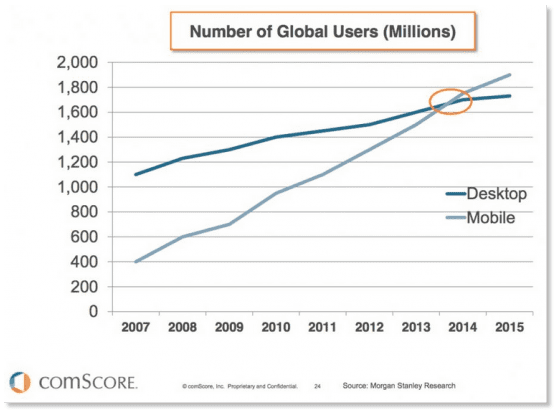Are you ready for the Google Mobile-friendly algorithm
change which could be 'bigger than Panda or Penguin'?
Back in November 2014,
Google gave its first guidance about the impending algorithm changes to
affect mobile SEO which were summarised in this Smart Insights alert. More
recently, Google has been unusually specific and has revealed on its blog that
there will be an algorithm update on the 21st April 2015, that will expand
their use of mobile-friendliness as a ranking signal.

How much difference will the mobile-friendly update make?
The indications are that this will be a major change with
Google describing it as 'significant' in their alerts. Then, in this alarming
quote, Google's Zineb Ait Bahajji said
at SMX Munich that the upcoming mobile-friendly algorithm update will impact
more sites than their Panda or Penguin algorithms. Although this sounds
alarming it is to be expected since Panda and Penguin targeted a limited set of
sites using spammy tactics, while this will affect all searches on mobile -
that's why Google says it's significant.
Since we're now getting close and the impact is significant,
this post is another reminder to explain the changes and impact according to
Google so you can check the likely impact to your site or your clients and be
in a position to explain it? Let's start with the big picture.
Will the update affect all pages on a site?
Google has announced that this update will take place in
‘real-time’, meaning that if changes are made to make websites more
mobile-friendly, as soon as the changes have been indexed by Google the
benefits will be realised.
Google has also said that this algorithm update will impact
sites on a page-by-page basis, meaning that only those pages that are not
mobile-friendly will be impacted, rather than the wider domain.
This will mean that websites not deemed to be
‘mobile-friendly’ will suffer from reduced visibility within organic search
results. It’s also possible that this reduction in visibility may extend to
desktop as an additional incentive to webmasters to improve mobile experiences.
We'll explain how you can test your pages are mobile friendly below.
Why is Google implementing these changes?
At present, Google considers that the experience of some
sites featured in the mobile search results are simply not good enough for the
increasing majority of people now using Google on their mobile devices.
Despite the promotion of YouTube, Android and Google+,
Google is still heavily reliant on AdWords to generate the majority of their
revenue. If a search does not offer value to users, then they may end up going
elsewhere, representing a risk to Google’s revenue stream.
At the moment, mobile search results largely match desktop
and are typically ranked based on the merits of the desktop site based on the
combination of on-page and off-page ranking factors. However, it seems Google
believe this isn't acceptable with the tipping point of mobile traffic
outstripping desktop traffic by Q2 2015 already passed.






0 comments:
Post a Comment